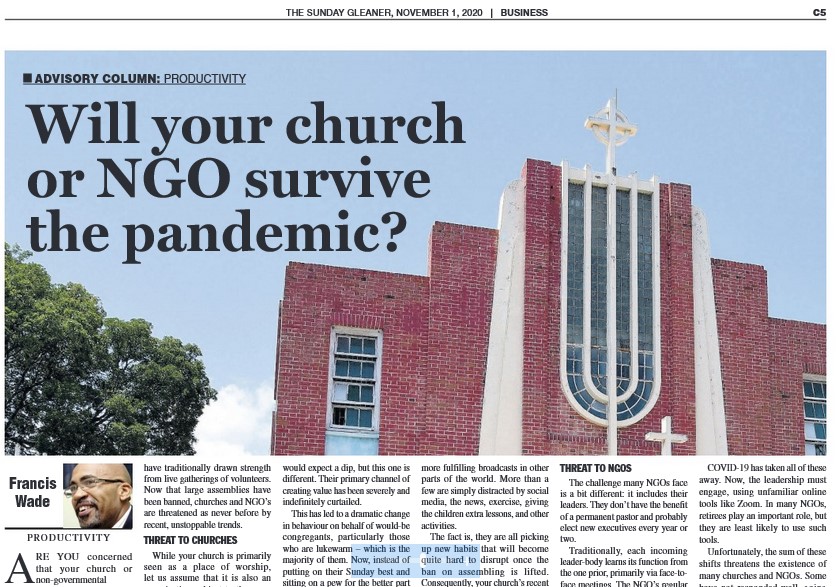Are you concerned that your church or Non-Governmental Organization (NGO) may not survive the combined punches of a pandemic and a recession? You should be. But there’s much you can do to intervene and turn things around.
Most of us can appreciate the devastating impact of COVID-19 on industries such as education, entertainment, hotels and restaurants. But there are other effects being felt in two sectors which have traditionally drawn strength from live gatherings of volunteers. Now that large assemblies have been banned, churches and NGO’s are threatened as never before by recent, unstoppable trends.
The Threat to Churches
While your church is primarily seen as a place of worship, let’s assume it’s also an organization subject to the same requirements as others: it needs manpower and funding to maintain its operations.
In particular, the Saturday or Sunday morning service plays not only a spiritual role, but it also serves a commercial activity: fund-raising. Traditionally, this has been driven by donations from live attendees.
In any recession, its elders would expect a dip but this one is different. Their primary channel of creating value has been severely and indefinitely curtailed.
This has led to a dramatic change in behaviour on behalf of would-be congregants, particularly those who are lukewarm – the majority. Now, instead of putting on their Sunday best and sitting on a pew for the better part of the day, they are engaging in alternatives.
Some are watching their home church’s services online. Via Google Search, others have switched to more fulfilling broadcasts in other parts of the world. More than a few are simply distracted by social media, the news, exercise, giving the children extra lessons and other activities.
The fact is, they are all picking up new habits which will become quite hard to disrupt once the ban on assembling is lifted. Consequently, your church’s recent drop in donated income may not be temporary. Neither is the reduction in attendance. And, even when the bans lift, your elders will still have a recession to contend with.
The Threat to NGO’s
The challenge many NGO’s face is a bit different: it includes their leaders. They don’t have the benefit of a permanent pastor and probably elects new executives every year or two.
Traditionally, each incoming leader body learns its function from the one prior, primarily via face-to-face meetings. Its regular activities and fundraising events have also always been in-person. So has its AGM where dues are collected and elections are conducted.
COVID-19 has taken all of these away. Now, the leadership must engage using unfamiliar online tools like Zoom. In many NGO’s, retirees play an important role but they are least likely to use such tools.
Unfortunately, the sum of these shifts threaten the existence of many churches and NGO’s. Some have not responded well, going into hibernation; a wait-and-see approach. Their hope is that things will return to “normal” someday soon.
Hopefully, your organization realizes this urgent, existential threat and plans to devise a new strategy. Here are some steps to take.
1. Craft New Commercial Strategies, Abandon the Old
While your church or NGO may have built its existence on long, stable traditions, consider this a call to re-think everything. A mission of “Continuing our Tradition” might need to be replaced.
Now, you must define a fresh destination, one that will appeal to a highly distractible audience wary of in-person gatherings. This should mean looking 5-10-30 years to the future to craft the details of a vision in which you are unique in meeting your followers’ needs.
Once your end-point has been defined, fill in the steps to be followed over the time period. On the commercial side, use metrics such as members, donations and special event income to show where your growth will come from. Include milestones along the way which describe the path to follow.
2. Draft New Skills
If your board lacks the skills necessary, co-opt younger persons who have them. For example, if none of your leaders have regularly attended a range of virtual services, include someone who has. Ask them for help in defining new ways to add value which appeal to Millennials and successive generations.
Time is of the essence. Don’t delay because of pride. Instead, assume the worse: that Jamaica won’t have a vaccine or achieve herd immunity until after 2021.
To save your organization from extinction in the meantime, forsake any wishful thinking and embrace the fact that there are irreversible trends at play which are moving against you. Rally your members and show them that this isn’t about a temporary convenience but an entirely new way to fulfill your mission.

